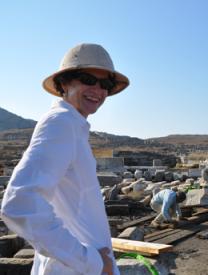Mantha Zarmakoupi (BA/MA, Athens; MDes, Harvard; MSt and DPhil, Oxford) specializes in Hellenistic and Roman architecture, landscape architecture and urbanism, with a distinct focus on the social, economic and cultural conditions underpinning design, but her research and teaching interests cover all aspects of Greek, Roman and Etruscan visual and material culture, including the use of computer applications in their study. In her research and teaching, Zarmakoupi brings together a specialist’s knowledge of ancient architecture and urbanism with an interdisciplinary approach to classics and archaeology and a broad understanding of art history. She has published widely on Roman luxury villas, including the monograph Designing for Luxury on the Bay of Naples (c. 100 BCE – 79 CE): Villas and Landscapes (Oxford 2014) and edited volume The Villa of the Papyri at Herculaneum: Archaeology, Reception, and Digital Reconstruction (De Gruyter 2010).
Her current research extends the field of ancient urbanism in new directions. She works on a project on the urban growth of late Hellenistic and Roman Delos, addressing the relationship between economic and social change, urban growth, physical infrastructure and maritime networks, in the context of which she co-directs an underwater fieldwork survey around Delos and Rheneia (2014-). She also co-directs with George Koutsouflakis an underwater survey around islands Levitha, Kinaros and Maura in the central Aegean Sea (2018-) in order to examine the maritime connections of ancient Greece with Asia Minor. Zarmakoupi also co-leads with Simon Richards the Delos Network – a research initiative that aims to investigate the Ancient Greek Cities project and publications of C. A. Doxiadis and his collaborators in the context of 1960s and 1970s discussions about the future of urban planning – and collaborates with colleagues from the Universities of Kiel, Athens, Paris, Aarhus and Bergen in an Erasmus+ Strategic Partnership project (2017-20) that aims to create a digital learning environment and MOOC on Ancient Cities.

